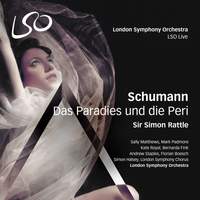Recording of the Week,
Simon Rattle conducts Schumann's Das Paradies und die Peri
“It's the great masterpiece you've never heard”, says Simon Rattle of Schumann's oratorio, Das Paradies und die Peri. I must admit I had certainly never heard it until now; despite Rattle's suggestion that it was Schumann's most popular piece during his lifetime, nowadays it seems to be a fairly rare visitor to the concert hall, and the number of available recordings is only in single digits. Hopefully this thrilling new recording with the London Symphony Orchestra will go a long way towards redressing that neglect.

The Peri of the title is a winged spirit from Persian mythology. In Thomas Moore's poem on which the text of Schumann's work is based, the Peri has been expelled from Paradise, but is told that she will be allowed to re-enter if she can bring back an example of something that is dearest to God. After two failed attempts, where she offers a drop of blood from a soldier killed in battle and the last sigh of a young girl who refused to leave the side of her plague-stricken lover, the Peri's third offering (the tear of a sinner who had repented at the sight of a child in prayer) is accepted, and she is allowed into heaven once more.
You can imagine how such a colourful story would enable Schumann to come up with some wonderfully evocative music. Stylistically it often sounded to me like a hybrid of Brahms's German Requiem and Mendelssohn's Elijah, combining the harmonic language and choral writing of the former with the dramatic gestures and narrative power of the latter.
One of the highlights for me comes in Part One, where the chorus sings of the mighty prince Gazna's exploits on the battlefield, during which he encounters a defiant young hero. With some hair-raising choral singing and some declamatory fanfares from the trumpets, it's an exhilarating passage, followed immediately by the stirringly plangent cries from the chorus of 'Weh, weh, weh' (Woe, woe, woe), as the young hero falls.
Having said that, as much as I enjoy all of the loud bits, I found myself coming back to the quiet, contemplative moments even more. After the triumphant ending of Part One, where the Peri (radiantly sung by Sally Matthews) presents the hero's drop of blood to heaven, Part Two begins somewhat more despondently: an Angel (sung movingly and magnificently by Bernarda Fink) explains that, alas, the blood is not sufficient to open the heavenly gates, and the Peri must continue in her search.
The whole piece is narrated by tenor Mark Padmore, and he is in quite extraordinary voice here: the hushed passage where he describes the Peri arriving in a plague-stricken land is nothing short of spine-tingling, with an amazingly mournful horn solo, so simple on the page and yet when brought to life by such expert players as the LSO it becomes an astonishingly poignant moment.
Having listened to this piece countless times over the last week or so, I can only agree with Rattle's assessment: this is a stunning work which deserves to be much better-known. This recording also happens to be his first release on LSO Live with the orchestra of which he will become Music Director in two years' time, and on the basis of these sensational first fruits, I look forward very much to many more fine recordings, and hopefully to further resurrected masterpieces!
Sally Matthews (Peri), Mark Padmore (tenor), Kate Royal (soprano), Bernarda Fink (alto), Andrew Staples (tenor), Florian Boesch (bass), London Symphony Orchestra & Chorus, Simon Rattle
Available Formats: 2 SACDs + Blu-ray Audio, MP3, FLAC, Hi-Res FLAC



